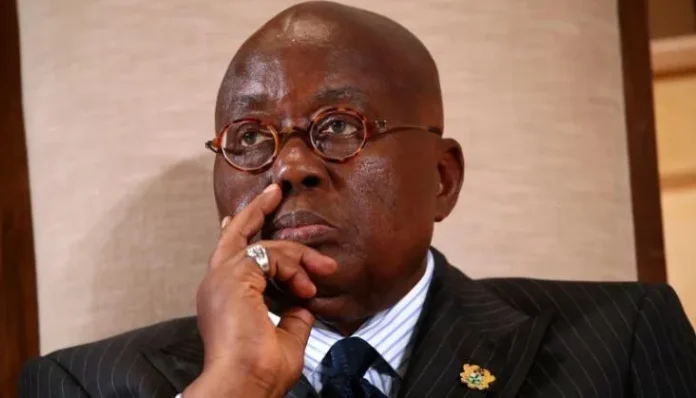Politics
NPP Leaders Face Internal Critique Over Election Defeat Accountability


A prominent member of Ghana’s ruling New Patriotic Party (NPP), Dankwa Smith Butey, has publicly rebuked the party’s national executives for attributing its 2024 electoral defeat to former President Nana Addo Dankwa Akufo-Addo.
Butey, widely known as Chairman Butey, argued that the leadership’s failure to hold Akufo-Addo accountable during his tenure contributed significantly to the party’s loss, urging introspection rather than blame-shifting.
In a radio interview with Accra-based Sompa FM, Butey challenged executives to acknowledge their own shortcomings, stating, “If Akufo-Addo’s actions cost us the election, what did you do as leaders to correct him at the time?” He criticized the executives for remaining silent during Akufo-Addo’s presidency despite what he described as detrimental decisions, emphasizing that their inaction undermined the party’s bid to “break the eight” a reference to breaking Ghana’s two-term electoral cycle.
“You were silent when he acted, and now you blame him? The executives must accept responsibility for this defeat,” Butey asserted. He called on NPP members to reject any current national executive seeking re-election, framing the plea as a necessary step toward revitalizing the party’s governance structure.
The remarks follow mounting tensions within the NPP after its failure to secure a third consecutive term, a historic first in Ghana’s democratic era. Butey’s critique underscores broader frustrations over leadership accountability, with some members accusing the party’s hierarchy of prioritizing loyalty over corrective action during Akufo-Addo’s administration.
Structural Reflection
Butey’s comments highlight a recurring theme in Ghanaian politics: the tension between party loyalty and internal accountability. His assertion that “we brought the party to power” reflects a belief that leaders bear ultimate responsibility for steering elected officials, even presidents, toward party interests. This stance resonates with factions advocating for stronger internal checks to prevent centralized decision-making from alienating voters.
The NPP’s defeat marks a pivotal moment for Ghana’s political landscape, with opposition parties capitalizing on public discontent over economic challenges and governance perceptions. While Akufo-Addo’s policies remain a focal point of post-election analysis, Butey’s intervention redirects scrutiny toward the mechanisms or lack thereof that allowed such decisions to proceed unchecked.
As the NPP regroups, the party faces a dual challenge: addressing internal governance critiques while reconnecting with a base disillusioned by unmet expectations. How it navigates this reckoning could shape its trajectory ahead of future elections, testing its ability to balance unity with accountability in a rapidly evolving political climate.
Source: newsghana.com.gh



President Mahama to walk the runway at Ghana Fashion Week in July
In a bold and exciting announcement, President John Dramani Mahama revealed that he will make a special appearance on the...


Chez Amis gifts herself Rolls Royce Cullinan on birthday
Renowned Accra-based restaurateur Chez Amis has marked her birthday in grand style by gifting herself a brand-new Rolls Royce Cullinan,...


Akosua Ago Aboagye joins Sompa FM as Accra branch radio manager
Seasoned broadcaster Akosua Ago Aboagye has joined Sompa FM as the Radio Manager for its Accra branch. She made the...


Mahama unveils ‘Black Star Experience’ to boost tourism and culture
President John Dramani Mahama has announced the launch of ‘The Black Star Experience’ as part of his administration’s vision to...


Akosua Ago Aboagye resigns from Despite Media after 20 years
After two decades with Despite Media, seasoned broadcaster Akosua Ago Aboagye has officially announced her resignation. In an emotional farewell...


Lilwin to pay GH₵300,000 to Martha Ankomah in GH₵5million defamation suit
Ghanaian actors Martha Ankomah and Kwadwo Nkansah Lilwin have settled their defamation dispute, bringing an end to the GH₵5 million...
Trending
-

 Showbiz5 days ago
Showbiz5 days agoThe African Giant is dead – Burna Boy says his people killed him
-

 Showbiz2 weeks ago
Showbiz2 weeks agoPlus-size advocate and actress Monalisa Stephen passes away
-

 Showbiz1 week ago
Showbiz1 week agoDada KD died after being turned away from two hospitals – Manager reveals
-

 Showbiz2 weeks ago
Showbiz2 weeks agoVeteran singer Dada KD reportedly dead
-

 Showbiz2 weeks ago
Showbiz2 weeks agoThe most shocking takeaways from Cassie Ventura’s testimony against Diddy
-

 Showbiz1 week ago
Showbiz1 week agoDavido’s barber reflects on humble beginnings and loyalty
-

 Showbiz2 weeks ago
Showbiz2 weeks agoNigerian TV journalist Bukola Agbakaizu dies while on duty
-

 Showbiz2 weeks ago
Showbiz2 weeks agoThey have used me – Oheneni Adazoa breaks ties with NPP
